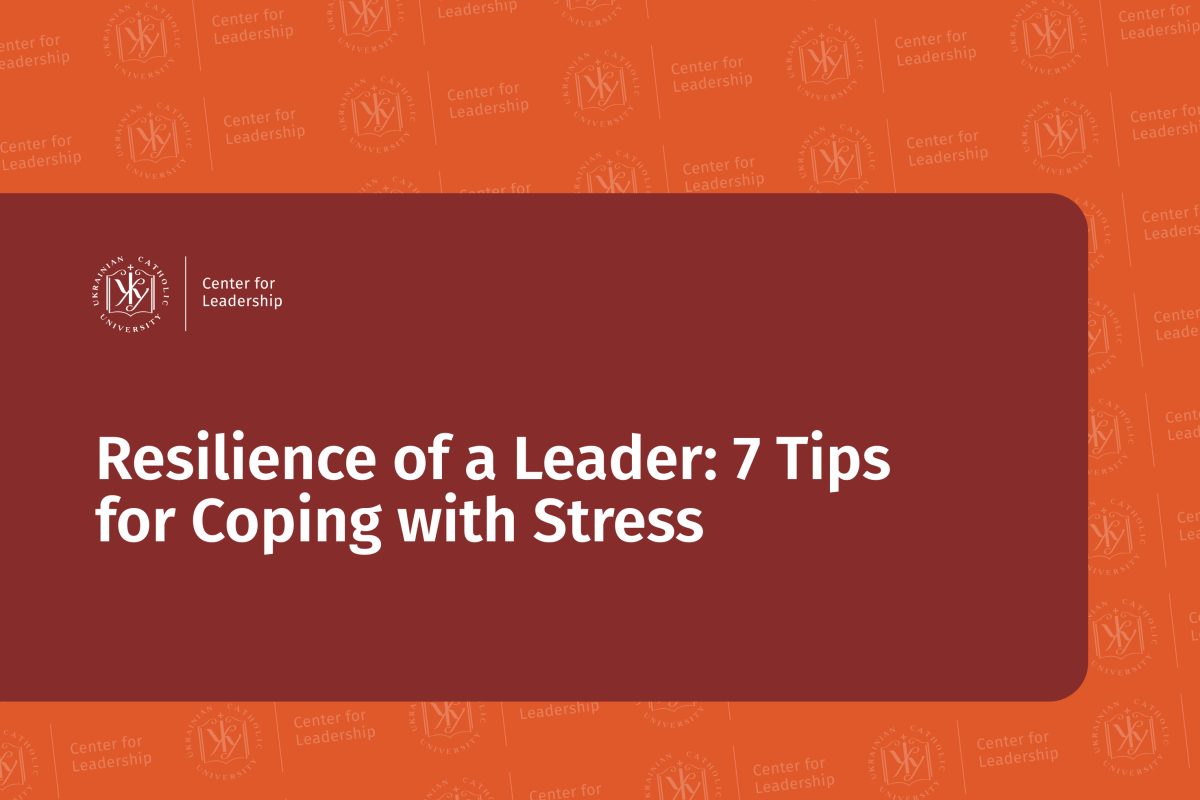
Resilience of a Leader: 7 Tips for Coping with Stress
Resilience has become one of the key traits of Ukrainian leaders in 2023, a topic first discussed during the Alumni Leadership Day in 2021. Larisa Galadza, Canada’s Ambassador to Ukraine, delivered a lecture titled “Leader’s Resilience.” Today, this topic remains highly relevant, and Andrew Rozhdestvensky, Executive Director of the CfL UCU, provides updated insights on resilience during these challenging times.
7 Tips for Building Resilience During Stress:
1. Clear values provide direction even in difficult times, making it essential to establish them.
Andriy Rozhdestvensky explains: “We often discuss this in our crisis leadership programs: values, vision, and mission are what help people maintain morale when things get tough. This applies not only to company values but also personal ones. During the first weeks of the full-scale invasion, we held webinars with Oleh Romanchuk. I frequently refer to his points on personal resilience, which include:
- A sense of purpose;
- Acting with hope (taking consistent action with faith that things will work out);
- Wise and positive thoughts (limiting negative information and focusing on positivity).
It’s crucial to monitor both physical and mental well-being during these times. Leaders must first take responsibility for themselves because if something happens to them, they won’t be able to help others and will need saving themselves.”
2. Monitor your well-being and find tools to restore your resources—through rest, new experiences, or exercise.
3. Everyone has their own level of resilience, so keep this in mind when working with colleagues, partners, or teams. Avoid exerting pressure, as everyone has different breaking points.
Andriy reflects on this lesson from the early days of the full-scale invasion: “When we launched several volunteer projects with a wide variety of people, we quickly substituted and supported each other with our skills and knowledge, making it incredibly effective. We constantly monitored each other’s states—sometimes someone wouldn’t realize they were nearing burnout, and we’d suggest they take a break while the rest of us handled the tasks.”
4. Create a diverse environment. When your team is composed of people with different experiences, collective resilience increases. Shared values further strengthen endurance.
5. Strategic planning and identifying opportunities and threats (SWOT analysis) will help foresee or avoid challenges.
6. Communicate in advance. Use careful wording but honestly address dangers and risks to allow others to prepare for difficulties.
7. Plan your response to emergencies—outline a clear algorithm of actions.
Rozhdestvensky comments: “Points 5-7 are about creating a vision of what to do both generally and in specific critical situations, and building communication around that vision. It’s about creating an information field for colleagues, showing them what we’ll do if disaster strikes.
When we held crisis leadership lectures during the first week of the war and collected information for case studies, companies that quickly activated and took action had a plan in place a month before February 24, just in case something happened.
Some of these companies said, ‘We took lessons from COVID and applied them during the invasion.’ Interestingly, these same teams previously mentioned that they used their experiences from 2014 during the pandemic.
So yes, strategic planning is crucial. Plans might falter in the early days of drastic change, but they gradually rebuild. It’s like sailing from London to New York—when a storm hits, you first get through the storm, and once it subsides, you recalibrate and continue on course. The final goal and direction inspire us and tie into the first point—values and a sense of purpose for why we’re doing this.”
Additional Personal Insights from Larisa Galadza:
- Small things can have a big impact.
- Sleep is your friend.Rozhdestvensky adds: “Sleep is the cornerstone. In the first three days after February 24, I slept only four hours a night, until I decided I had to get proper rest, no matter what. I slept for nine hours and woke up with a completely different mindset—ready to fight.”
- It’s okay if your rest feels monotonous, as long as it helps you recover.
- Find peace and quiet.
This pivotal lecture, held as part of Alumni Leadership Day, continues to be relevant and effective in fostering societal resilience.
💬“Everything Ms. Larisa spoke about works. We see it now in various teams that continue to function despite the full-scale invasion,” adds Andriy Rozhdestvensky.